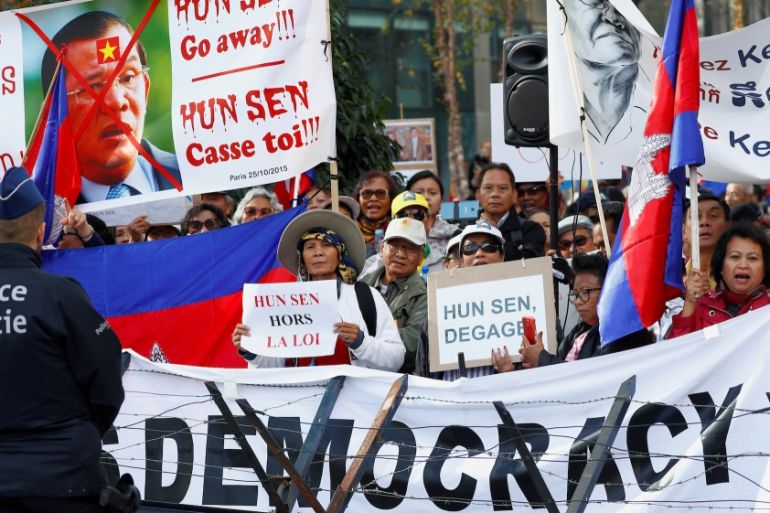There is still hope for Cambodia’s democracy
The international community has to pressure Cambodia to hold free and fair elections.

It is now just over a year since I was thrown into exile at the stroke of a pen.
On 16 November 2017, the Cambodian Supreme Court disbanded my party – the Cambodia National Rescue Party (CNRP), the country’s only viable opposition force – and stripped me and 54 fellow MPs of our seats. The court, like virtually all of Cambodia’s judiciary, is deeply politicised and, for all intents and purposes, does the bidding of the government.
A few weeks before the ruling, CNRP President Kem Sokha was detained on ludicrous “treason” charges and was languishing in solitary confinement. The writing was on the wall – I realised I was likely the next target. By the end of October, I had fled my beloved Cambodia and I have not been able to return since.
The court’s ruling was part of a wider effort by Prime Minister Hun Sen and his ruling Cambodia People’s Party (CPP) to ensure victory in the sham general election held on July 29 this year. The CPP used the year before the vote to launch an unprecedented crackdown on dissent, jailing human rights activists, silencing what little remained of independent media, and locking up or exiling almost all leading opposition figures.
Unsurprisingly, the CPP eventually won all 125 National Assembly seats in the vote, having run essentially unopposed. International actors – including the European Union, the United States and the United Nations – dismissed the election as a sham and refused to send observers. Undeterred, Hun Sen gave a victory speech on polling day where he – without a hint of irony – thanked his supporters for “choosing the path of democracy”.
For decades, Hun Sen has been a master manipulator of international opinion. He has ruled Cambodia in a quasi-authoritarian fashion, bending the rules of democracy just enough to maintain deniability. But the recent crackdown and outright banning of the opposition are unprecedented.
As a decades-long supporter of the struggle for democracy and rights, I see this as the most serious crisis we have faced so far. Cambodia’s descent into one-party rule means that what little checks and balances there were on Hun Sen are now gone. It also has dangerous implications for Southeast Asia as a whole, where authoritarianism is on the rise and rulers often copy each other’s worst practices.
I and my colleagues have spent the past year travelling the globe, trying to raise awareness of the situation in Cambodia and drumming up international support for a return to democracy.
CPP officials, meanwhile, have since the vote engaged in a desperate bid to shore up the party’s tarnished reputation. They have travelled the world trying to present themselves as a legitimate government – thankfully, no one is buying the ruse.
On October 5, just days before Hun Sen was due to visit Brussels for an annual EU-Asia summit, the EU announced it was withdrawing the so-called “Everything But Arms” trading preference from Cambodia, citing “grave violations” of human rights. This is a highly unusual move by the EU, and in the past has been reserved for conflict-torn countries like Sri Lanka and Myanmar. In response, the Cambodian government called the EU’s announcement an “extreme injustice”.
|
|
At home, Hun Sen has – in a blatant public relations move – moved Kem Sokha into house arrest and released a handful of political prisoners and activists since the election. Most have been let off with sinister warnings not to criticise authorities again.
These are piecemeal concessions and fundamental change is needed. The repressive laws used against dissidents are still on the legal books, and the CPP still rules the country with an iron fist.
But all is not lost. Cambodia has a young and growing population that has no memory of the genocidal Khmer Rouge regime: Two-thirds of Cambodians today are under 30 years of age. It is this generation that is hungry for the fundamental freedoms Hun Sen’s government is intent on dismantling. The CPP’s authoritarian rule will struggle to meet their demands in the long run.
Despite Hun Sen’s bluster and growing closeness to China, the CPP’s moves since the election also highlight how the regime is still courting international opinion. Now is the time for Cambodia’s international allies to use this leverage. EU countries, the US, Japan and others need to pressure the CPP to change course immediately, before it’s too late. The only way to restore our democracy is to reinstate the CNRP MPs who lost their seats, free Kem Sokha from detention and hold new elections that are genuinely free and fair.
During my year in exile, I have met Cambodian diaspora groups from Australia to Europe and South Korea – and many, many places in between. They all want the same thing – a democratic country where human rights are respected and where people are free to choose their future for themselves. This will not be possible as long as Hun Sen and the CPP remain in power.
The views expressed in this article are the author’s own and do not necessarily reflect Al Jazeera’s editorial stance.
